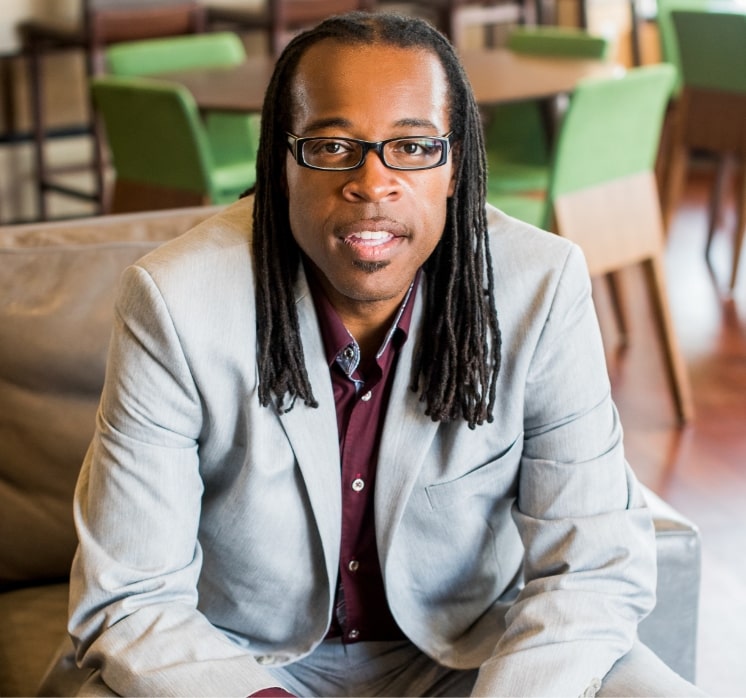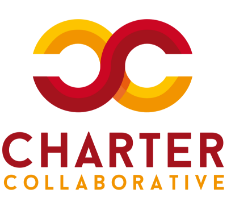
Shawn Hardnett
Founder & CEO,
Statesmen College Preparatory
Academy for Boys
Statesmen College Preparatory Academy for Boys
Location: Washington, DC
Year Opened: 2018
Student enrollment: 187
Grades served: 4-6
Website: www.statesmenboys.org
Student Demographics
Black/African-American: 99%
Two or more races: 1%
Homeless Students: NA
FRPM/FRPL %: NA
Students with Disabilities: 28%
ELL/ESL Students: 0%
MY EDUCATIONAL JOURNEY
As an African American man, I believe that I had an education that was consistent with many African American men. What was given to me was given to everyone like me. Or that is what I thought. In truth, I lucked out in a way many of my contemporaries did not. I grew up in the inner city in upstate New York. I grew up in a household with two older brothers and a younger sister. My family is like many of the children who I designed this school for.
There were four of us children in the house – all attending different public schools at the same time. My mom wanted to make sure that we got a good education as far as she understood a good education to be, so we were all signed up for the urban-suburban program and ended up integrating traditionally all-white public schools. We were made to feel like we didn’t belong, and we struggled in school. We didn’t feel smart. We didn’t feel that we could be smart. Through all of that, my mom measured that we were doing better than other kids and ensured that we had access to a relatively decent education. As I think back on it, many of my teachers were pretty good.
Thinking about this work now, I want the young scholars that I work with today to experience having not only good teachers, but good teachers who are Black and Brown, who affirm their identity and create a space where they feel loved and smart and taken care of – like they belong. That’s the reason I continue to do the work that I do. Even in my leadership development work, I’ve supported many Black male leaders and I want them to feel loved and supported and intelligent, and that they can learn from their mistakes and move on to do even better work.
NAVIGATING THE PANDEMIC AS A COMMUNITY
There’s this quote by David Augsburger: “Being heard is so close to being loved that for most people it’s indistinguishable.” We started this school based on listening to Black and Brown boys, creating opportunities for them
to be their normal, quirky, charming, curious and delightful selves as well as just talk about what was important to them. So when we went into COVID, we already knew that we were going to do the same thing. We asked them, “What’s going to make this work?” The relationships we had with them were so strong that we knew that what everybody else was reporting as an issue would not be as much of an issue for us, because of how deliberately we chose to leverage the relationships we’d worked so hard to create.
We talked to our parents over and over again. We asked them, “What do you need?” and we went back and gave them what they needed. So, it was not a surprise to us that 97% of our kids were online every day. It wasn’t a surprise that they would choose to be with us from 9:45-2:45 each day. It wasn’t a surprise that we were going to be in uniforms. We were going to find a way to make the joy factor come across on the screen in the same way that we did in person, because those were things that mattered for us. And it wasn’t a surprise that we were going to make them work
hard.
Our parents, especially parents who had children in more than one school, were just blown away. The difference was so apparent. We have a few parents who were lucky enough to have their kids in private schools, parents who were able to get their kids in Catholic schools, some paid for it on their own, some through scholarships, who said that there was a world of difference between what was going on at Statesman as compared to what was going on at the private, independent or district school their other child attended. They talked about how their son was happy to get online every day when his brothers and cousins were dancing around the house half-dressed and happy.
Statesmen Academy for Boys is in startup mode, which is its own form of crisis, and in a crisis because of COVID, and in crisis because of the pandemic of anti-Black male racism that has always existed. All of this has impacted my school, my staff, my students, their families as they have had to watch this.
CARING FOR SELF AND OTHERS
In the Manati Fellowship, we are being micro-affirmed as leaders of color on a regular basis. This really safe environment was created where we can come in as we are and discuss issues as they occur and get support. That is the greatest gift you can give in this movement. Never once were we told, “Well, you’re doing it wrong” or “That’s not smart.” We were always affirmed. Instead we hear, “You’re the bomb. You’re a Black leader of a small school serving some of the most underserved children in the United States of America, and you’re doing it, so let’s start with that.” Let’s start with “You good from the gate.”
Many of my white contemporaries are affirmed because they’re in the room. We are not. We come in and we have to mentally, emotionally and psychologically create safety so we can begin to engage. This is the power of stereotype threat. If I’m in a space where I’m concerned that who I am as a Black man is threatened, 50% of my mental capacity, of my executive functioning, is being spent on creating safety in that space. Sometimes, that turns into just shut up and be. I walk into Manati and I feel affirmed, so I’m bringing my best thinking to whatever’s in the space. I have access to my full capacity – to lead, to think, and to be a problem solver.
In Manati, through the work that we’ve done around self-care, I’ve come to appreciate that you leave yourself vulnerable to horrible mistakes, mistakes that may be out of character when you are in distress. Stress that’s part of the job is good, it makes you stronger. But distress, when you are pushed beyond your proximal zone of execution, when you are constantly under attack, buried in work and drama and you don’t have ways to take care of yourself, you’re liable to make some pretty flashy mistakes. Manati taught me how to manage that stress. Even realizing that working from home can happen outside, in the sun, near the water, that came directly from Manati and changed my work-life balance.
So much of what we’ve done in Manati has been intuitive. Eventually, you want to take what is intuitive and make it formal. The resource guide we created has helped to codify what Manati has done for us in a way that allows us to do it with others. I spend more time at check-ins with my staff just listening and asking, “How are you?” As a result, my staff shares more with us, and because they share more with us, they’re more bonded with us. They’re able to let go and do more and better work, because they know we’re watching them and loving on them and taking care of their needs. That’s a big deal.
THE FUTURE OF EDUCATION
In 10 years, I will be unsatisfied if we haven’t completely shifted the way people think about the education of Black and Brown boys and men nationally. It is important for us as a nation to begin to see the fact that Black and Brown boys stay in the bottom 10% and have been there so long that it’s ridiculous. With 20+ years into ed reform, billions of dollars invested in ed reform, the gap between Black and Brown boys and White girls has gotten bigger. That should be shameful for us.
Organizations started, led, and managed by Black and Brown leaders who understand this experience must be supported in codifying how they accomplish success. Black and Brown leaders are going to go into communities that are struggling the most. They will need more support for longer periods of time in order to get to the point where they are phenomenal. We need our partners and funders to stand by us – longer. Since we’re dealing with a problem that’s more than 100 years old, can we have more than 3 years to fix it? Before we are asked to replicate, could you give a brotha 5, 10 years to fix the 400-year problem. Then you have permission to ask, “How do we do another one?”
You cannot center joy and care and love and not get results. You can’t care for a young Black boy and not teach him to read. You can’t say you love a Black boy and not give him access to the literary canon, because he’s going to have to go out into the world and be seen as a part of what is happening and be able to contribute. He’s going to need to
have a voice.
And with a demographic that has been underserved for years, that’s not 2 or 3 years and you’re at the top of the charts. You’re going work hard, smart and still the results may come slowly. I remember Donald Hense, a stalwart in this work saying, “Slow down. To get this right, it’s going to be a marathon, not a sprint. You gotta take your time – the time.” We want growth not just in their ability to read but in their ability to think that reading is important, their ability to think of themselves as readers, to love themselves as such, and to see that they are so many more things – great readers being only one of them. This is about love. This is about positive regard and deliberate action to benefit someone else regardless of what you get in return. This is about consistent action on behalf of a person or a group, even when that action unnerves them, unnerves those who are attached to them, and unsettles your convenience.
This is about love and how we look at Black and Brown boys next to the images of Black and Brown men we see in the world and say, “I love you”? Love is about being with a person as they are and as they become what they are intended to be
